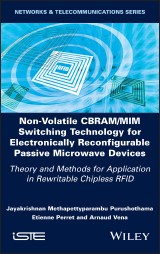Details

Non-Volatile CBRAM/MIM Switching Technology for Electronically Reconfigurable Passive Microwave Devices
Theory and Methods for Application in Rewritable Chipless RFID1. Aufl.
|
139,99 € |
|
| Verlag: | Wiley |
| Format: | |
| Veröffentl.: | 01.03.2022 |
| ISBN/EAN: | 9781119902805 |
| Sprache: | englisch |
| Anzahl Seiten: | 224 |
DRM-geschütztes eBook, Sie benötigen z.B. Adobe Digital Editions und eine Adobe ID zum Lesen.
Beschreibungen
This book presents the applications of non-volatile CBRAM/MIM switching technology for electronically reconfigurable passive RF and microwave devices, together with theory and methods for application in rewritable chipless RFID tags. Conductive Bridging Random Access Memory (CBRAM) is a renowned and commercially used non-volatile memory concept. Having evolved over the past few decades, it is currently identified as an efficient non-volatile RF switching technology.<br /><br />This book presents recent research on this topic, focusing on the development of a new generation of low-cost non-volatile RF switches and their applications, demonstrating both high performance and flexibility of implementation. It includes the experimental realization of various prototypes of RF and microwave devices utilizing this technology, along with relevant analysis of mathematical and electrical models, and detailed discussions of future aspects. All devices presented are compatible with mass industrial production at an economically efficient budget through optimized fabrication steps, without the requirement of sophisticated “clean room” processes among them.
<p>Preface ix</p> <p><b>Chapter 1. Motivation and Background: RF Switches and the Need for a Non-Volatile RF Switch </b><b>1</b></p> <p>1.1. Introduction 1</p> <p>1.2. Requirements and definition of a switch at RF and microwave frequencies 2</p> <p>1.3. Review of RF and microwave switching technologies 4</p> <p>1.3.1. Electromechanical switches: MEMS 6</p> <p>1.3.2. Solid-state semiconductor switches 9</p> <p>1.3.3. Memristive RF switches 14</p> <p>1.4. State of the art of CBRAM/MIM RF switching technology 24</p> <p>1.5. Demand for a non-volatile RF switch and selection of CBRAM/MIM technology 30</p> <p>1.6. Conclusion 37</p> <p><b>Chapter 2. Real-World Implementation Challenges of a Low-Cost Non-Volatile RF Switch </b><b>41</b></p> <p>2.1. Introduction 41</p> <p>2.1.1. Conductive bridging random access memory switches based on nafion as ion conductor 42</p> <p>2.2. CBRAM-based fully passive solid-state RF switch on classic RF substrates: design and process optimization 50</p> <p>2.2.1. Design of a CBRAM-based shunt mode RF switch 50</p> <p>2.2.2. Fabrication process 53</p> <p>2.2.3. Results and discussions 57</p> <p>2.3. Electrical equivalent model analysis 61</p> <p>2.4. Effect of filament resistance of CBRAM switches on RF transmission 63</p> <p>2.5. Time stability, switching cycles and other interesting features 66</p> <p>2.5.1. Reason for choice of CPW transmission line for presented switch 69</p> <p>2.6. Fabrication technique for realization of CBRAM/MIM RF switches on flexible substrates 71</p> <p>2.6.1. CBRAM-based fully passive solid-state RF switch on flexible paper substrates 71</p> <p>2.6.2. Results and discussion 75</p> <p>2.7. Application example: design and realization of solid-state non-volatile SPDT switch 78</p> <p>2.8. Conclusion 81</p> <p><b>Chapter 3. Solid-State Rewritable Chipless RFID Tags: Electronically Rewritable RF Barcodes </b><b>83</b></p> <p>3.1. Introduction: chipless RFID technology 83</p> <p>3.2. Chipless RFID reader system used in this experiment 85</p> <p>3.3. Realization of solid-state electronically rewritable chipless RFID tags 87</p> <p>3.3.1. Electronically rewritable chipless RFID tags on classic rigid substrates 88</p> <p>3.3.2. Electronically rewritable chipless RFID tags on flexible substrates 93</p> <p>3.4. Effect of CBRAM/MIM filament resistance on RCS characteristics of presented electronically rewritable resonators 98</p> <p>3.5. Electrical equivalent model of electronically rewritable chipless RFID tags 99</p> <p>3.6. Discussion of data encoding strategies for electronically rewritable chipless RFID tags based on CBRAM/MIM technology 107</p> <p>3.7. Advantages of using integrated CBRAM/MIM switches for chipless RFID applications 111</p> <p>3.8. Conclusion 116</p> <p><b>Chapter 4. Fully Passive Solid-State Electronically Reconfigurable Filter and Antenna Models </b><b>119</b></p> <p>4.1. Introduction 119</p> <p>4.2. CBRAM-MIM switches for electronically reconfigurable filter applications 119</p> <p>4.2.1. Electronically reconfigurable band-stop filter 120</p> <p>4.2.2. Discussion of extension of the proposed idea of CBRAM/MIM RF switching to more efficient filter topologies 139</p> <p>4.3. MIM switches for electronically pattern reconfigurable antenna applications 146</p> <p>4.3.1. Electronically radiation pattern steerable antenna using CBRAM/MIM RF switches (design and fabrication) 147</p> <p>4.4. Advantages of using proposed CBRAM RF switch technology for reconfigurable antenna and filter applications 162</p> <p>4.5. Conclusion 165</p> <p>Conclusion 167</p> <p>Appendix 171</p> <p>References 181</p> <p>Index 195</p>
<b>Dr. Jayakrishnan Methapettyparambu Purushothama</b> is a Postdoctoral Researcher at Grenoble Alpes University in France. His current research interests include non-volatile RF switches, RFID systems, and general RF and microwave electronics engineering.<br /><br /><b>Dr. Etienne Perret</b> is an Associate Professor at Grenoble Alpes University in France. His current research interests include advanced computational approaches for RF and THz applications, wireless communication systems and RF switches, and he has made numerous pioneering contributions in the field of chipless RFID.<br /><br /><b>Dr. Arnaud Vena</b> is an Associate Professor at the University of Montpellier/CNRS in France. His current research interests are in the field of wireless sensors, non-volatile RF switches, RFID systems, and new innovations in printed electronics for RF and microwave engineering.


















